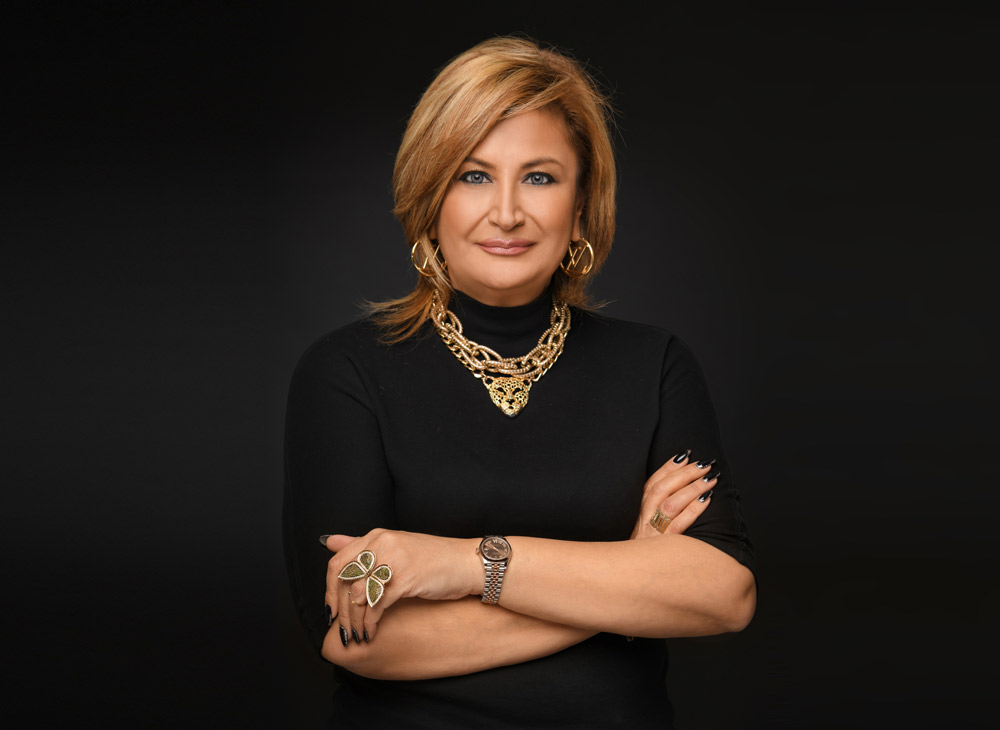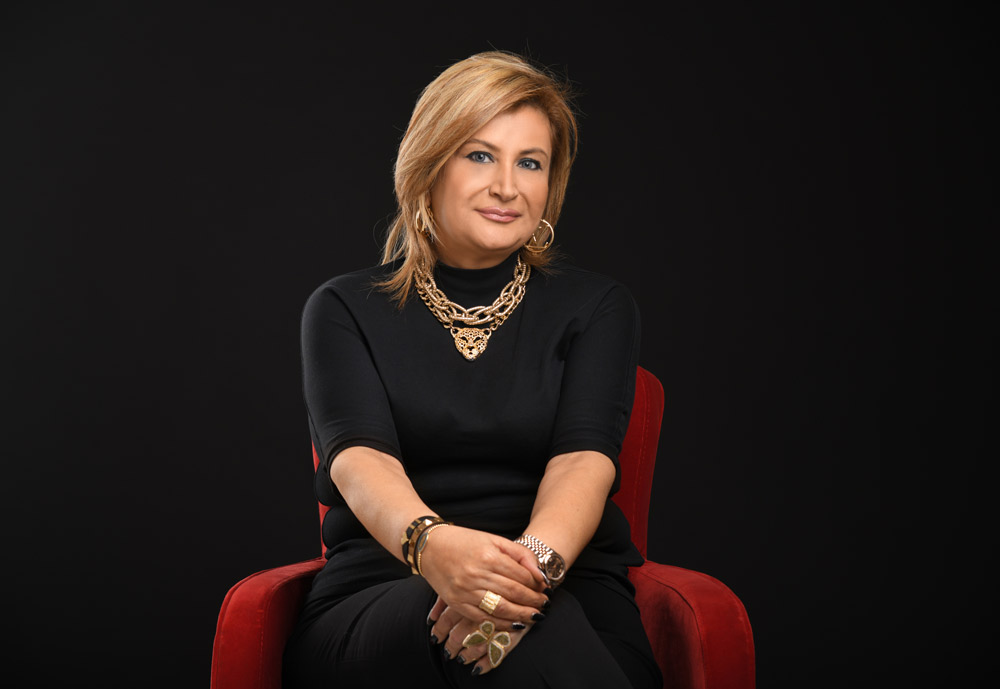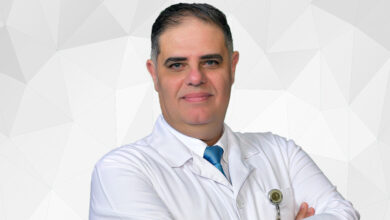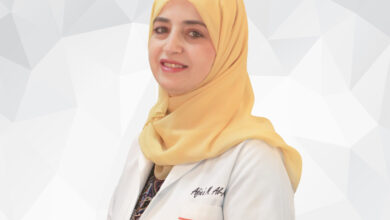The Arab Hospitals Federation celebrates a significant occasion this year, marking its twenty-fifth anniversary. A quarter-century of dedicated efforts to advance health in Arab countries.

As we reflect on the Federation’s journey, we recall the achievements, the conquered challenges, and the profound impact it has left on the Arab healthcare sector. On this occasion, we had the pleasure of interviewing the Chief Executive Officer of the Federation, Mrs. Alice Yammine Boueiz, who shared insights into the twenty-five-year journey and presented to us the Federation’s strategic plan for 2024-2025, launched earlier this year, outlining the Federation’s direction and approach for the upcoming years.
The Arab Hospitals Federation has embarked on an extensive journey that was marked by success and a notable presence within the Arab healthcare landscape. Can you provide us with a brief overview?
Over the past twenty-five years, the Arab Hospitals Federation has played a crucial role in the healthcare arena, becoming a symbol of this sector through dedicated efforts and notable achievements. The journey has been extensive, witnessing the implementation of robust health policies, pioneering developments in healthcare transformation, a commitment to providing sustainable healthcare, and the development of strong partnerships with regional and international organizations. Our collaborative efforts have contributed to raising the standards of healthcare delivery, ensuring that the Arab people have access to world-class medical services.
We are truly proud of what has been achieved, and we will strive to continue progressing and delivering the best, especially with our affiliated hospitals, that have been at the forefront of innovation, tirelessly working to provide advanced healthcare, adopting the latest technologies and embracing the best practices in healthcare management. Together, we have established a network of institutions that goes beyond buildings with beds and equipment; they serve as beacons of hope, healing, and compassion.
What distinguishes this legacy that has evolved over 25 years of Arab, regional, and global presence?
The Arab Hospitals Federation stands out as a distinctive Arab organization representing hospitals and healthcare institutions across Arab countries since its establishment in 1999. Over the years, it has pioneered initiatives that have become significant landmarks in the Arab healthcare landscape. Its annual forum “MedHealth” has evolved into a distinguished official platform bringing together prominent healthcare organizations, decision-makers, government officials, authorities, stakeholders, and partners.
Furthermore, the AHF has been instrumental in creating various essential activities, initiatives, and strategies.
Collaborating with policymakers, it has played a key role in formulating policies that contribute to advancing health in Arab countries and assisting healthcare facilities in addressing present and future challenges.
Serving as the voice of Arab healthcare bodies, the AHF maintains close ties with major Arab authorities and bodies, including the League of Arab States, Arab Ministers of Health Council, Egyptian Healthcare Authorities (General Healthcare Authority, General Authority for Healthcare Accreditation and Regulations, General Authority for Unified Procurement UPA, etc.), Department of Health Abu Dhabi, Hamad Medical Corporation in Qatar, and international organizations such as the World Health Organization, HIMSS, Planetree, The International Hospital Federation, among others. The AHF’s consistent contributions to policy recommendations in healthcare have been highly valued.
Moreover, the federation has undertaken numerous capacity development activities, offering support to members in advanced, emerging, and developing countries. These activities have not only fostered knowledge but also enhanced the expertise of the Arab healthcare workers community.
Do you believe that, after this long journey, there are still challenges facing the Arab healthcare sector, and how can they be overcome?
As we celebrate our successes, we must also acknowledge the ongoing challenges. The current evolution in the field of healthcare requires us to remain vigilant, adaptable, and responsive to the needs of our communities. The COVID-19 pandemic has underscored the importance of solidarity, resilience, and preparedness in facing unprecedented global health crises. During the last twenty-five years, the federation has undergone massive changes, such as restructuring and globalization, yet it has emerged stronger and more effective than ever.
As we look to the future, we must continue to collaborate with key decision-makers to enhance policies, foster innovation, invest in sustainable and digital transformation, build the capacities of our healthcare workforce, and address health disparities that persist in our societies. We must strive for a healthcare system that is not only effective and efficient but also equitable and accessible to all.

Here I pause briefly to extend our deepest gratitude to the successive Arab health ministers, key decision-makers, stakeholders, healthcare professionals, and administrators for their trust, support, and engagement, which have been the cornerstone of our success. We commend and appreciate their dedication, passion, and hard work.
We cannot forget our partners, supporters, and consistent collaborators, as their assistance and involvement have contributed to reshaping the healthcare sector in Arab countries. I would also like to extend our thanks to the members of Governing and Executive councils, in addition to the members of the General Assembly for their trust, determination in achieving success and overcoming all challenges.With them all, we renew our commitment to advancing healthcare in our region and envisioning a future where every individual has the opportunity to lead a healthy and fulfilling life.
The Executive Council of the Federation has launched its annual strategic plan for 2024-2025, outlining a roadmap that orients towards projects, ideas, and approach of the federation for the upcoming years. Can you provide insights into this strategy and its contents?
Indeed, in recent months, the members of the Executive Council have worked diligently to unveil the annual strategy of the Federation. The process was thorough and exhaustive, as everyone was seeking excellence in their ideas and proposals to align with the ongoing changes in the global healthcare sector. Numerous points were raised and presented, and the best were selected, aligning with the future of healthcare management. This year’s activities encompass events by the Arab Healthcare Sustainability Center, capacity-building programs, alliances, the Gold Initiative certificate, the Executive Circle, the annual awards, the partnerships, the healthcare strategies, and the advocacy.
In fact, can you describe the product offered by the Arab Hospitals Federation and to whom is it addressed?
Defining the product is essential to allow stakeholders better understand our scope and expertise. It is offered to three categories in the Arab world. It is provided to governments, authorities, policymakers, regional and international organizations such as the World Health Organization for the Eastern Mediterranean and the League of Arab States, with whom the Arab Hospitals Federation has worked extensively over 25 years, launching many health declarations, initiatives, and strategies supported by them.
It is offered to hospitals through the creation of a distinguished platform for communication and a network among members to share information, best practices, and the latest updates in the sector. In addition to assisting in the development of healthcare policies affecting member hospitals, supplying tools and information to empower individuals to enact change in institutions, systems, and communities, training and education, providing consultancy, and many other topics that can be accessed through our website. As for the third category, it is for low- and middle-income countries. The Federation plays a crucial role in helping weak and low-income countries strengthen the healthcare sector by providing consultations in building and upgrading healthcare infrastructure, including hospitals, clinics, and laboratories, to ensure their compliance with international standards. Additionally, it offers training programs for healthcare professionals to enhance their skills and knowledge, thereby boosting the overall capacity of the healthcare workforce. It also supports the implementation of electronic health records to improve data management, patient care and decision making without forgetting assisting in the development and implementation of emergency preparedness plans to effectively respond to natural disasters, pandemics, and other health crises, as well as other initiatives and campaigns.
The forums organized by the Arab Hospitals Federation constitute special and unique gatherings attended by decision-makers, ministers, executives, stakeholders, and professionals in the Arab healthcare sector. What are your activities for this year?
The year 2024 marks the twenty-fifth anniversary of the Arab Hospitals Federation, and on this occasion, significant and diverse activities will be organized to celebrate the silver jubilee. These activities will review the experiences we have gone through, the lessons we have learned, and how they will help us face challenges in the next twenty five years.
Among these activities is the Arab Healthcare Development Annual Forum AHDAF Qatar 2024, scheduled in April 2024 in strategic partnership with the Ministry of Public Health in Qatar, Hamad Medical Corporation, in collaboration with the League of Arab States, the World Health Organization for the Eastern Mediterranean, the Arab Health Ministers Council, and many health authorities in the Arab countries.
The second event is the Cairo Declaration for Universal Health coverage, where the Federation will organize a scientific day to recognize the diligent work carried out by the Egyptian health sector, upon the request and follow up by His Excellency President Abdel Fattah El-Sisi. During this event, a health declaration will be presented.
The third event is the celebration of the Silver Jubilee during the 25th Annual Forum MedHealth Abu Dhabi 2024. It will be held in Abu Dhabi on October 29-30, 2024, with the support of the Ministry of Health and Prevention in the United Arab Emirates, the Department of Health Abu Dhabi in collaboration with the League of Arab States, the World Health Organization for the Eastern Mediterranean, the Arab Health Ministers Council, and many health authorities in Arab countries. The forum will host Ministers of Health from Arab countries to celebrate this occasion, recognize personalities who contributed to the success of this journey, and discuss critical issues that align with the Federation’s approach.
This unique and important activity includes an opening ceremony, award ceremony, platforms for networking and partnerships, effective discussion sessions, informal conversations, interactive sessions, and roundtable discussions organized with top executives, authorities, and experts.
You talked during your discussion about the Arab Healthcare Sustainability Center, recently launched by the Arab Hospitals Federation. What is its role, and what will it offer to the Arab market?
It is a unique facility in the Arab region designed to provide support and assistance to healthcare leaders on their journey towards sustainability. The center offers a wide range of services, including setting a roadmap for hospitals, conducting training and educational sessions for healthcare professionals on various topics, and providing consultancy services aimed at turning pledges into concrete actions. The center has played a pivotal role during COP28 by participating in dialogues with high-level personalities in many panels and roundtable sessions, spreading its important mission in leading hospitals to be green.
The Arab Healthcare Sustainability Center works on developing practical guides for hospitals, providing basic information to help healthcare leaders and institutions define their starting points.
The center will announce a schedule of activities, training sessions, and events for this year in collaboration with the Holy Spirit University of Kaslik (USEK) in Lebanon, the Geneva Sustainability Center, and the World Health Organization for the Eastern Mediterranean, guiding hospitals towards the 3S principles: Sustainable, Smart, and Safe.
When elaborating on the strategy, we were captured by the subject of alliances. What does it mean, and what alliances are you referring to?
Forming an alliance in healthcare can be advantageous for various reasons, as it addresses challenges, fosters collaborative efforts and improves resource utilization, ultimately leading to improved patient care, better operational efficiency and a more resilient healthcare system. For this year, we have chosen two themes to establish alliances in:
The Arab Alliance for Value in Healthcare: This alliance brings together a diverse array of stakeholders, whether from public or private sectors, across Arab countries. Their collective goal is to strive for a unified vision for Arab countries where health systems prioritize value, sustainability, and a person-centered approach.
This second alliance holds significant importance. It is the Arab Alliance for AI in Healthcare, as AI plays a pivotal role in improving healthcare, impacting everything from diagnostic interpretation of medical
imaging to personalized therapeutics. The launching of the Arab Alliance for AI in Healthcare by the Arab Hospitals Federation aims to address the growing need for guidance for AI in healthcare and realize the potential for AI while addressing substantial challenges.
By bringing together various stakeholders, the Alliance will pool resources and knowledge to address safety concerns while providing a platform for sharing and development.
The directions and points set by the Federation for the upcoming year are both extremely significant and diverse. In conclusion, what would you like to add to this discussion?
The Federation’s directions for the coming year are indeed diverse and important, aligned with the developments and challenges in the healthcare sector. There is much more to be discussed beyond this interview, and it can be explored through our website, news, and activities. Developing the strategy for the year is vital for the Arab Hospitals Federation to guide the improvement of healthcare services, address emerging challenges, and contribute to the overall well-being of the communities it serves. We have strived to provide a roadmap for achieving long-term goals and maintaining a dynamic and resilient healthcare system, all with the aim of advancing health in the Arab countries and delivering the best for the patients and our communities.
Once again, a thousand thanks to your distinguished magazine and media channels. You are truly a unique and exceptional media partner in the Arab world, contributing significantly to the advancement of a future that serves our societies. Thank you for your follow-up, presence, and participation in the Arab healthcare arena. Thanks to our friend Simon Chammas for his excellence and dedication in delivering the best through this prestigious regional media platform. May the next twenty five years be filled with greater achievements in serving health and humanity.
















